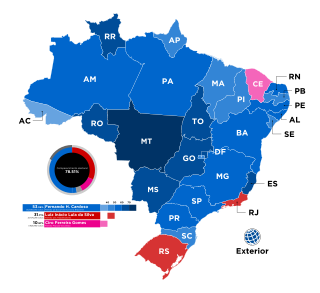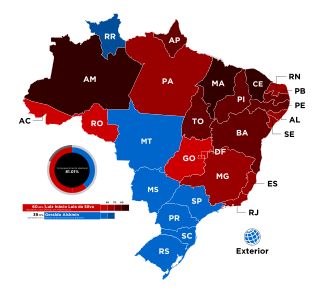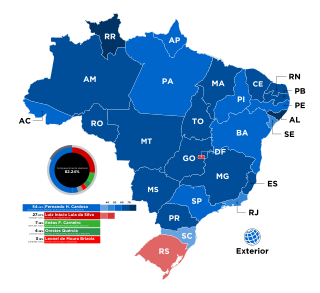You can help expand this article with text translated from the corresponding article in Portuguese. (February 2018)Click [show] for important translation instructions.
|
Lindbergh Farias | |
|---|---|
 | |
| Member of the Chamber of Deputies | |
| Assumed office 1 February 2023 | |
| Constituency | Rio de Janeiro |
| In office 1 February 2003 –21 December 2004 | |
| Constituency | Rio de Janeiro |
| In office 1 February 1995 –1 February 1999 | |
| Constituency | Rio de Janeiro |
| Member of the Municipal Chamber of Rio de Janeiro | |
| In office 1 January 2021 –1 February 2023 | |
| Constituency | At-large |
| Senator for Rio de Janeiro | |
| In office 1 February 2011 –1 February 2019 | |
| Preceded by | Régis Fichtner |
| Succeeded by | Flávio Bolsonaro |
| Mayor of Nova Iguaçu | |
| In office 1 January 2005 –31 March 2010 | |
| Vice Mayor | Sheila Gama |
| Preceded by | Mário Marques |
| Succeeded by | Sheila Gama |
| President of the National Union of Students | |
| In office 1992–1993 | |
| Preceded by | Patricia de Angelis |
| Succeeded by | Fernando Gusmão |
| Personal details | |
| Born | Luiz Lindbergh Farias Filho 8 December 1969 João Pessoa,Paraíba,Brazil |
| Political party | PT (2001–present) |
| Other political affiliations | |
| Spouse | Maria Antonia Goulart (m. 1994;div. 2018) |
| Domestic partner | Gleisi Hoffmann (2020–present) |
| Children |
|
Luiz Lindbergh Farias Filho, commonly known only as Lindbergh Farias (born 8 December 1969), is a Brazilian former student union leader and politician. [1]
Contents
Lindberg became famous as student leader, specially in 1992, when he was president of the National Union of Students (UNE) and one of the main leaders of the student movement Caras-Pintadas (Painted Faces) against the then president Fernando Collor de Mello, who was his ally before Lindberg's political career. [2] [3] [4] Farias attended Medicine and Law colleges, but never got a degree. [5]
After leaving the student movement, he was elect Federal Deputy for two legislatures. He was also elect and re-elect Mayor of Nova Iguaçu, in Baixada Fluminense. In 2010, Lindbergh was elect Senator for Rio de Janeiro.
In 2014, he ran for Governor of Rio de Janeiro for the Workers' Party (PT), [6] when he placed 4th, with 10% of the valid votes. [7]









